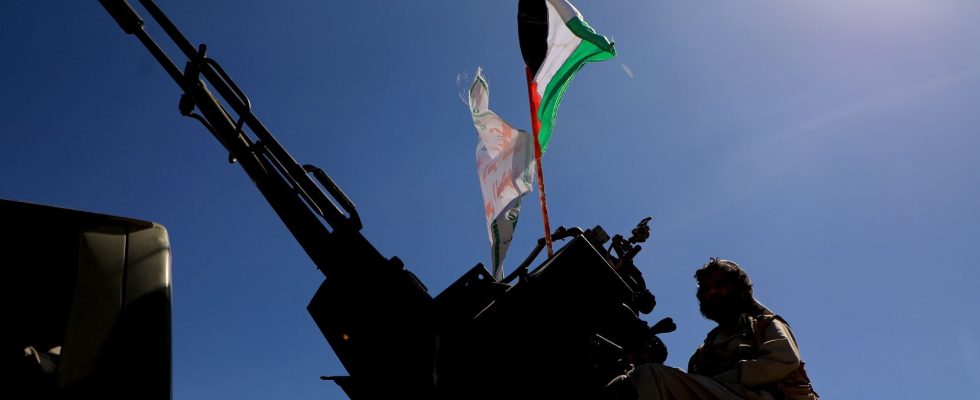A ravaged city center, shooting near hospitals and a population on the run: Khan Younes was the scene, Wednesday, January 31, of fierce fighting against a backdrop of calls from the UN to maintain aid to Gaza from its agency to Palestinian refugees. In parallel with this controversy, the United States, Egypt and Qatar are working behind the scenes to try to convince Israel and Hamas to commit to a new truce.
Information to remember
⇒ Missile fire against an American warship in the Red Sea
⇒ Intense fighting in Khan Younès, the main city in the south
⇒ Hamas says it is examining a truce proposal
Missiles attack US warship in Red Sea
Yemen’s Houthi rebels said Wednesday they had targeted a US warship in the Red Sea, hours after the US military said it had shot down a missile.
The rebels “launched several appropriate naval missiles at the American destroyer USS Gravely in the Red Sea,” they said in a statement.
Khan Younès, scene of fierce battles on the ground and in the tunnels
During the night of Tuesday to Wednesday, January 31, witnesses reported heavy strikes on Khan Younes, the main town in the south of the Gaza Strip where Israeli forces on the ground are trying to defeat fighters from the Palestinian Islamist movement Hamas. The Hamas Health Ministry counted 125 deaths in violence in Gaza from late Tuesday to Wednesday morning. An assessment that no independent source is able to verify.
Teams from al-Amal hospital, one of the largest in the city along with the Nasser medical center, reported fighting not far from the establishment and a shortage of food. “We left the Nasser hospital without mattresses, under bombings and airstrikes. We did not know where to go, we were not given a specific place to go. We are in the cold, left to our own devices, without tents and nothing to survive,” said a Palestinian woman who fled to Rafah, further south.
In Khan Younes, an AFP reporter traveling with Israeli forces testified to a destroyed city center, with gutted buildings on muddy ground and soldiers sinking into tunnels.
“Every war has its own characteristics and I think that this war, its fundamental character lies in the ground and underground maneuvers. That is the character of this war,” declared Dan Goldfus, commander of the 98th parachute division of the Israeli army.
Refugee aid operations under threat
In the devastated territory besieged by Israel, in the grip of a major humanitarian crisis, the bombings have pushed 1.7 million Palestinians, according to the UN, out of a total of 2.4 million inhabitants, to flee their homes. Adding to the population’s distress, the civilian aid operations of the UN agency for Palestinian refugees (UNRWA) are under threat after Israel accused 12 of the UN agency’s 30,000 regional employees of involvement in the attack of October 7. Following the accusations against UNRWA employees, thirteen countries, including the United States, the largest donor, suspended their contributions while waiting for the agency to shed light on the alleged involvement of its employees.
“These decisions […] will have catastrophic consequences for the population of Gaza. No other entity has the capacity to provide aid of this magnitude” to a population which “needs it so urgently”, heads of UN agencies argued overnight. No other organization is “capable of replacing or substituting for the enormous capacity and fabric of UNRWA”, declared for her part the UN humanitarian coordinator for the Palestinian Territories, Sigrid Kaag, after a closed meeting of the Council of security.
For the Israeli government, UNRWA has “fundamentally compromised” by letting Hamas “use its infrastructure” to carry out its military activities and “hide terrorists”. And this agency, many Israeli politicians have repeated, is no longer part of Gaza’s “future.” Key allies of Israel, the United States judged that measures must be taken at UNRWA “so that this type of thing does not happen again”, while recognizing the “crucial” work of this agency.
Negotiations for a new truce
In parallel with this controversy, the United States, Egypt and Qatar are working behind the scenes to try to convince Israel and Hamas to commit to a new truce, after that of a week in November which had allowed the release of hostages in Gaza in exchange, among others, for Palestinian prisoners imprisoned in Israel. Hamas leader Ismail Haniyeh confirmed Tuesday that his movement had received a truce proposal, the result of a meeting in Paris between CIA Director William Burns and Egyptian, Israeli and Qatari officials.
“Hamas is examining the proposal” and preparing its response, he said, adding that leaders of the movement had been invited to go to Egypt “to discuss the framework agreement resulting from the Paris meeting.” and its “implementation”. Israeli Prime Minister Benjamin Netanyahu, however, affirmed on Tuesday that Israel would not “withdraw the army from the Gaza Strip” and would not release “thousands of Palestinian terrorists” in exchange for hostages.
An influential far-right minister, Itamar Ben Gvir, threatened on Tuesday to leave the government if Benjamin Netanyahu gave the green light to a “reckless” agreement to free the hundred hostages in Gaza. In the pages of Foreign Affairs, CIA chief William Burns writes: “I have spent much of the last four decades working in and on the Middle East and have rarely seen a situation so complex and explosive.
